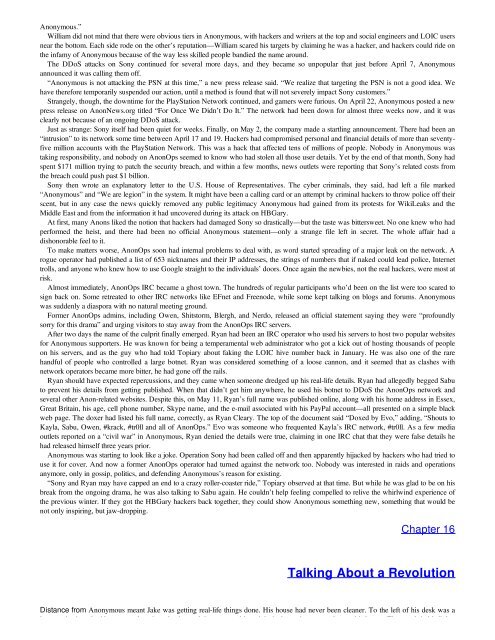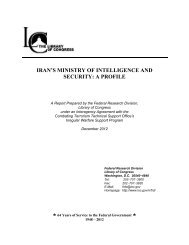We are anonymous inside the hacker world of lulzse
We are anonymous inside the hacker world of lulzse
We are anonymous inside the hacker world of lulzse
Create successful ePaper yourself
Turn your PDF publications into a flip-book with our unique Google optimized e-Paper software.
Anonymous.”<br />
William did not mind that <strong>the</strong>re were obvious tiers in Anonymous, with <strong>hacker</strong>s and writers at <strong>the</strong> top and social engineers and LOIC users<br />
near <strong>the</strong> bottom. Each side rode on <strong>the</strong> o<strong>the</strong>r’s reputation—William sc<strong>are</strong>d his targets by claiming he was a <strong>hacker</strong>, and <strong>hacker</strong>s could ride on<br />
<strong>the</strong> infamy <strong>of</strong> Anonymous because <strong>of</strong> <strong>the</strong> way less skilled people bandied <strong>the</strong> name around.<br />
The DDoS attacks on Sony continued for several more days, and <strong>the</strong>y became so unpopular that just before April 7, Anonymous<br />
announced it was calling <strong>the</strong>m <strong>of</strong>f.<br />
“Anonymous is not attacking <strong>the</strong> PSN at this time,” a new press release said. “<strong>We</strong> realize that targeting <strong>the</strong> PSN is not a good idea. <strong>We</strong><br />
have <strong>the</strong>refore temporarily suspended our action, until a method is found that will not severely impact Sony customers.”<br />
Strangely, though, <strong>the</strong> downtime for <strong>the</strong> PlayStation Network continued, and gamers were furious. On April 22, Anonymous posted a new<br />
press release on AnonNews.org titled “For Once <strong>We</strong> Didn’t Do It.” The network had been down for almost three weeks now, and it was<br />
clearly not because <strong>of</strong> an ongoing DDoS attack.<br />
Just as strange: Sony itself had been quiet for weeks. Finally, on May 2, <strong>the</strong> company made a startling announcement. There had been an<br />
“intrusion” to its network some time between April 17 and 19. Hackers had compromised personal and financial details <strong>of</strong> more than seventyfive<br />
million accounts with <strong>the</strong> PlayStation Network. This was a hack that affected tens <strong>of</strong> millions <strong>of</strong> people. Nobody in Anonymous was<br />
taking responsibility, and nobody on AnonOps seemed to know who had stolen all those user details. Yet by <strong>the</strong> end <strong>of</strong> that month, Sony had<br />
spent $171 million trying to patch <strong>the</strong> security breach, and within a few months, news outlets were reporting that Sony’s related costs from<br />
<strong>the</strong> breach could push past $1 billion.<br />
Sony <strong>the</strong>n wrote an explanatory letter to <strong>the</strong> U.S. House <strong>of</strong> Representatives. The cyber criminals, <strong>the</strong>y said, had left a file marked<br />
“Anonymous” and “<strong>We</strong> <strong>are</strong> legion” in <strong>the</strong> system. It might have been a calling card or an attempt by criminal <strong>hacker</strong>s to throw police <strong>of</strong>f <strong>the</strong>ir<br />
scent, but in any case <strong>the</strong> news quickly removed any public legitimacy Anonymous had gained from its protests for WikiLeaks and <strong>the</strong><br />
Middle East and from <strong>the</strong> information it had uncovered during its attack on HBGary.<br />
At first, many Anons liked <strong>the</strong> notion that <strong>hacker</strong>s had damaged Sony so drastically—but <strong>the</strong> taste was bittersweet. No one knew who had<br />
performed <strong>the</strong> heist, and <strong>the</strong>re had been no <strong>of</strong>ficial Anonymous statement—only a strange file left in secret. The whole affair had a<br />
dishonorable feel to it.<br />
To make matters worse, AnonOps soon had internal problems to deal with, as word started spreading <strong>of</strong> a major leak on <strong>the</strong> network. A<br />
rogue operator had published a list <strong>of</strong> 653 nicknames and <strong>the</strong>ir IP addresses, <strong>the</strong> strings <strong>of</strong> numbers that if naked could lead police, Internet<br />
trolls, and anyone who knew how to use Google straight to <strong>the</strong> individuals’ doors. Once again <strong>the</strong> newbies, not <strong>the</strong> real <strong>hacker</strong>s, were most at<br />
risk.<br />
Almost immediately, AnonOps IRC became a ghost town. The hundreds <strong>of</strong> regular participants who’d been on <strong>the</strong> list were too sc<strong>are</strong>d to<br />
sign back on. Some retreated to o<strong>the</strong>r IRC networks like EFnet and Freenode, while some kept talking on blogs and forums. Anonymous<br />
was suddenly a diaspora with no natural meeting ground.<br />
Former AnonOps admins, including Owen, Shitstorm, Blergh, and Nerdo, released an <strong>of</strong>ficial statement saying <strong>the</strong>y were “pr<strong>of</strong>oundly<br />
sorry for this drama” and urging visitors to stay away from <strong>the</strong> AnonOps IRC servers.<br />
After two days <strong>the</strong> name <strong>of</strong> <strong>the</strong> culprit finally emerged. Ryan had been an IRC operator who used his servers to host two popular websites<br />
for Anonymous supporters. He was known for being a temperamental web administrator who got a kick out <strong>of</strong> hosting thousands <strong>of</strong> people<br />
on his servers, and as <strong>the</strong> guy who had told Topiary about faking <strong>the</strong> LOIC hive number back in January. He was also one <strong>of</strong> <strong>the</strong> r<strong>are</strong><br />
handful <strong>of</strong> people who controlled a large botnet. Ryan was considered something <strong>of</strong> a loose cannon, and it seemed that as clashes with<br />
network operators became more bitter, he had gone <strong>of</strong>f <strong>the</strong> rails.<br />
Ryan should have expected repercussions, and <strong>the</strong>y came when someone dredged up his real-life details. Ryan had allegedly begged Sabu<br />
to prevent his details from getting published. When that didn’t get him anywhere, he used his botnet to DDoS <strong>the</strong> AnonOps network and<br />
several o<strong>the</strong>r Anon-related websites. Despite this, on May 11, Ryan’s full name was published online, along with his home address in Essex,<br />
Great Britain, his age, cell phone number, Skype name, and <strong>the</strong> e-mail associated with his PayPal account—all presented on a simple black<br />
web page. The doxer had listed his full name, correctly, as Ryan Cleary. The top <strong>of</strong> <strong>the</strong> document said “Doxed by Evo,” adding, “Shouts to<br />
Kayla, Sabu, Owen, #krack, #tr0ll and all <strong>of</strong> AnonOps.” Evo was someone who frequented Kayla’s IRC network, #tr0ll. As a few media<br />
outlets reported on a “civil war” in Anonymous, Ryan denied <strong>the</strong> details were true, claiming in one IRC chat that <strong>the</strong>y were false details he<br />
had released himself three years prior.<br />
Anonymous was starting to look like a joke. Operation Sony had been called <strong>of</strong>f and <strong>the</strong>n app<strong>are</strong>ntly hijacked by <strong>hacker</strong>s who had tried to<br />
use it for cover. And now a former AnonOps operator had turned against <strong>the</strong> network too. Nobody was interested in raids and operations<br />
anymore, only in gossip, politics, and defending Anonymous’s reason for existing.<br />
“Sony and Ryan may have capped an end to a crazy roller-coaster ride,” Topiary observed at that time. But while he was glad to be on his<br />
break from <strong>the</strong> ongoing drama, he was also talking to Sabu again. He couldn’t help feeling compelled to relive <strong>the</strong> whirlwind experience <strong>of</strong><br />
<strong>the</strong> previous winter. If <strong>the</strong>y got <strong>the</strong> HBGary <strong>hacker</strong>s back toge<strong>the</strong>r, <strong>the</strong>y could show Anonymous something new, something that would be<br />
not only inspiring, but jaw-dropping.<br />
Chapter 16<br />
Talking About a Revolution<br />
Distance from Anonymous meant Jake was getting real-life things done. His house had never been cleaner. To <strong>the</strong> left <strong>of</strong> his desk was a<br />
large notice board with paperwork and a calendar, and <strong>the</strong>re was a thirty-eight-inch monitor to supplement his laptop. The couch in his living



